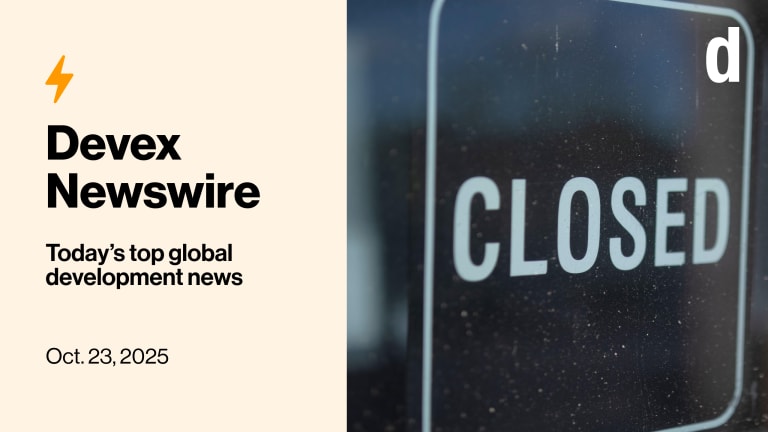
A £120 million ($152 million) economic development project which accompanied the United Kingdom government’s controversial migrant deportation deal with Rwanda shows an “uglier vision of development diplomacy,” according to experts.
Concerns have been raised around the transparency of the project, which the government has said will not be funded by the aid budget — despite it being focused on “programs to improve the lives of people in Rwanda and develop the country, the economy, job prospects, and opportunities,” according to Home Secretary Priti Patel. She reportedly pushed through the project, issuing a ministerial direction, after officials raised concerns about its financial implications.
The government has refused to provide any more information about the economic development project’s timeline, scope, objectives, or whether a business case exists. Devex was directed to a Home Office blog that said the program will “enhance economic prosperity in the region by investing in upskilling, development and projects which will benefit both migrants and their hosts.”
Extensive preparatory work typically goes into development projects, particularly those worth more than £100 million, sources with experience of implementing U.K. government programs told Devex. When Priti Patel was international development secretary in 2016, the department approved a 37-page business case for a £5 million tea project in Rwanda.
"I am concerned about the complete lack of transparency about the £120M economic development partnership signed with Rwanda,” Laurie Lee, chief executive at Care International UK, wrote to Devex.
Lee pointed out that former Foreign Secretary Dominic Raab cut the aid budget for Rwanda from £62 million in 2019 to less than £30 million in 2021 after the U.K. government “decided to break the law and its own manifesto promise” by cutting official development assistance from 0.7% to 0.5% of gross national income, resulting in a £4.6 billion shortfall in the budget. The aid cuts disproportionately affected bilateral programs and countries in the African continent, according to official statistics.
“That resulted in devastating cuts to education and health funding for adolescent girls in Rwanda,” added Lee. “Will those projects be restarted by this funding the Home Office have suddenly found? We have absolutely no idea.”
The program indicated a “changing UK approach to 'development diplomacy,'” said Mark Miller, a director of program at the Overseas Development Institute think tank. He wrote: “The government is explicitly deploying its financial resources to support a recipient country's economic development while also serving the UK's own interests.”
Compared to other types of “national interest” approaches, “the Rwanda deal is a much uglier vision of development diplomacy” wrote Miller. “It exploits the gulf in income between the UK and Rwanda (UK per capita income is 50 times greater) to outsource UK's responsibilities to fairly consider asylum claims of the world's most vulnerable people. In doing so, it accelerates a race to the bottom in protecting the rights of refugees.”
But the U.K. has previously pursued self-interested approaches which have been praised, such as the Just Economic Transition Partnership with South Africa, which is “being looked at as a possible model to help accelerate global emissions reductions,” according to Millier. The project, announced last November, “promises cleaner energy and jobs for South Africa while meeting a collective international interest in cost effective emissions reduction,” he added as an example.
The migrant deportation deal — similar to one currently being negotiated by Denmark — has attracted significant controversy in the U.K., where irregular migration, particularly in so-called small boats across the English Channel, is a key political theme for the governing Conservative Party. Migrants who are transported to Rwanda from the U.K. who are found to be genuine refugees will not be able to return to the U.K. but will instead be granted the right to remain in the central African country, and supported by a five-year integration package.








